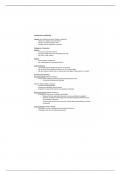Class notes
Psy1004F - Learning and conditioning Notes
- Course
- Institution
Detailed and comprehensive Lectures notes on learning and conditioning. Covers all content received for the topic in this course. Essential!! To your success in academics!!
[Show more]



